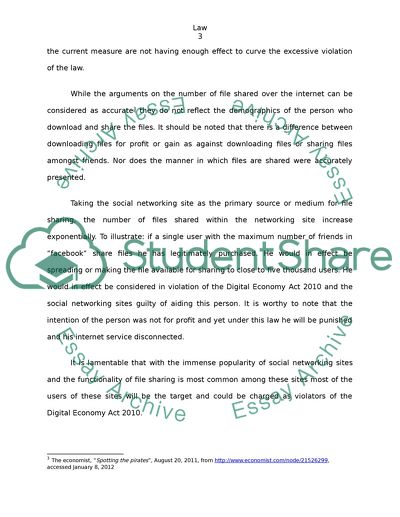Cite this document
(The Problem of Online File-sharing in Digital Economy Act 2010 Essay, n.d.)
The Problem of Online File-sharing in Digital Economy Act 2010 Essay. Retrieved from https://studentshare.org/law/1764413-critically-access-the-digital-economy-act-2010-do-you-think-this-is-an-appropriate-response-to-the-problem-of-online-file-sharing-give-reasons-for-your-answer-and-support-your-argument-with-appropriate-evidence
The Problem of Online File-sharing in Digital Economy Act 2010 Essay. Retrieved from https://studentshare.org/law/1764413-critically-access-the-digital-economy-act-2010-do-you-think-this-is-an-appropriate-response-to-the-problem-of-online-file-sharing-give-reasons-for-your-answer-and-support-your-argument-with-appropriate-evidence
(The Problem of Online File-Sharing in Digital Economy Act 2010 Essay)
The Problem of Online File-Sharing in Digital Economy Act 2010 Essay. https://studentshare.org/law/1764413-critically-access-the-digital-economy-act-2010-do-you-think-this-is-an-appropriate-response-to-the-problem-of-online-file-sharing-give-reasons-for-your-answer-and-support-your-argument-with-appropriate-evidence.
The Problem of Online File-Sharing in Digital Economy Act 2010 Essay. https://studentshare.org/law/1764413-critically-access-the-digital-economy-act-2010-do-you-think-this-is-an-appropriate-response-to-the-problem-of-online-file-sharing-give-reasons-for-your-answer-and-support-your-argument-with-appropriate-evidence.
“The Problem of Online File-Sharing in Digital Economy Act 2010 Essay”, n.d. https://studentshare.org/law/1764413-critically-access-the-digital-economy-act-2010-do-you-think-this-is-an-appropriate-response-to-the-problem-of-online-file-sharing-give-reasons-for-your-answer-and-support-your-argument-with-appropriate-evidence.


